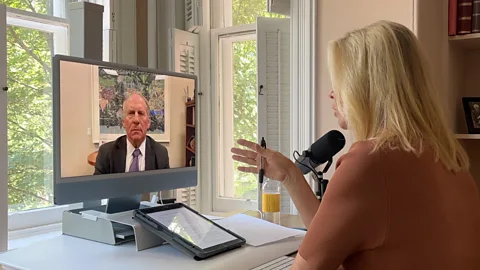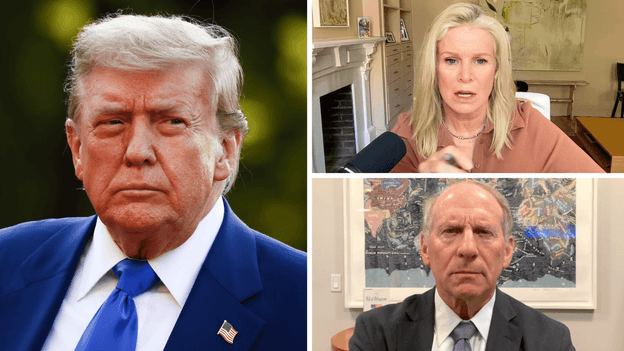 BBC
BBCHas US President Donald Trump found a new security doctrine with big air strikes taking the place of conventional wars? Should other countries expect more of this from the American military?
Even though we don’t have all the information yet, President Trump has suffered very little blowback and won considerable praise for his actions last weekend. In the aftermath of the strikes, US Vice President JD Vance took to social media to say that “we are seeing a foreign policy doctrine develop that will change the country (and the world) for the better,” adding that the US will use “overwhelming force” if necessary in the future.
So, it’s worth asking whether this mission will lead President Trump to move away from diplomacy and embrace more of this sort of military action moving forward. Or, was the hit against Iran’s nuclear programme really just a one-off, an exception to his isolationist tendencies?
I recently put that question to Richard Haass, a veteran US diplomat who has advised four presidents. Haass spent 20 years as president of the Council on Foreign Relations and is the author of more than a dozen books. He now writes the weekly newsletter Home & Away.
You can watch – or read – more of our conversation below.
Below is an excerpt from our conversation, which has been edited for length and clarity.
Katty Kay: Richard, I wanted to frame this conversation in the context of what this strike on Iran means for Trump and his appetite, potentially, for these kinds of military strikes moving forward. Do you think he risks paying a price either here or abroad for airstrikes of this nature?
Richard Haass: I’m not sure how replicable it is in other circumstances. The only area where he may have done himself a slight disservice is in perhaps potentially exaggerating what they’ve accomplished, using words like “obliteration“. Even if we destroyed a lot, we don’t know how much material, enriched uranium, centrifuges the Iranians may have parked elsewhere. So, I think he has to be a little bit careful that he doesn’t oversell this as a mission accomplished, problem solved.
But other than that, I think he’s OK because, one, it was limited. Two, a lot of people would say Iran had it coming in the sense that it had misled the IAEA inspectors for a long time. No one on God’s green Earth thought what the Iranians were doing was enriching uranium to generate electricity. So, I think people had just gotten tired of the whack-a-mole or kind-of cat-and-mouse game with the Iranians.
But again, I’m not sure this approach is replicable in terms of other countries potentially going nuclear, if it comes to that, or other situations. It doesn’t lend itself to Ukraine. It doesn’t lend itself to something with Taiwan or North Korea. I’m not sure this is a model or a template for American foreign policy going forward.
KK: If you were looking at this and had some concerns about this approach and that this might embolden President Trump to think, “Right, I found a new way of conducting American national security policy,” you seem to be suggesting that actually this might not embolden him to think, “I’m going to use strikes like this again elsewhere.”
RH: I really don’t see it for a couple of reasons. One is his MAGA base. Their enthusiasm for this is constrained. I think in some ways he got through this one. They don’t like to challenge him, but also it was bookended in terms of scale and time.
I’m a little bit hard-pressed when I look at the menu of things the United States faces. How many situations are analogous to this? I don’t see too many. North Korea has passed this point in terms of its nuclear and missile programs, plus it has this massive conventional force. So, a use of force against North Korea could well lead to a second Korean War. That’s not in Mr. Trump’s playbook. He doesn’t want direct confrontation with China or Russia if he could avoid it. He’s talked about certain things in this hemisphere, but he’s not going to attack Canada. He’s not going to attack Mexico. I doubt he’s going to do anything with Panama or Greenland. I just don’t see it.
KK: In your experience working in presidential administrations, does having some kind of military success tend to give presidents a feeling that it’s worth trying for something else, whether it’s these massive airstrikes or not?
Let’s say he really did want to take Greenland. Does what’s happened in Iran over the last five days make him feel emboldened to put pressure on Denmark to give us Greenland? And other countries can now look at President Trump and say, “Wow, this guy actually means what he says, and he’s not afraid to use force.”
RH: My short answer is: I hope not. What was unique about Iran is they were something of a pariah, and there was a very limited specific target set, which many people were quite sympathetic to our attacking. I don’t see any of that analogous in Greenland. You also can’t attack the Panama Canal in order to gain control of it.
Let me take a different president: George Herbert Walker Bush, the 41st president. He used force quite successfully in the Gulf War. Yet, he was quite hesitant later on to use force in the Balkans. So, it obviously depends on the president. And this president tends to go more by his gut than he does with careful interagency analysis. It’s really a top-down administration, much more than a bottom-up one. That’s not a criticism. It’s just an observation.
But I would be nervous if too many people around him, much less himself, thought that this was a formula that could be easily applied elsewhere.
Whether you think about tariffs or these strikes or pulling out of an international arrangement or doing something else, this is not an isolationist presidency. The more I look at Trump 2.0, the more I see it as unilateralist, having a very narrow sense of what is America first and then applying it. The word I keep coming back to is “unsentimental”. If you’re a friend, you shouldn’t necessarily assume that it buys you anything. And if you’re a foe, you may be treated in a very open way. It’s a surprisingly unbiased foreign policy, which I’ve never quite seen before.
KK: Do you still think that Trump himself is isolationist? You talked about the MAGA base being so, but from what he has done so far, would you call Trump himself an isolationist?
RH: Probably not. I would say more unilateral than isolationist. He has an allergy of sorts to big, open-ended military interventions. He has a narrower view of US interests. But he’s used force several times. He’s certainly not isolationist in the diplomatic sense, whether it’s using tools like tariffs or sanctions or launching this or that proposal. So no, I don’t think isolationism captures his foreign policy.
KK: You mentioned that you see this administration as a very top-down administration. What strikes me about the last couple of days, Richard, is the degree to which we have seen people around the president falling over themselves to flatter him. What are the risks of that approach?
RH: The downside of it is just what you would think: I wonder how many people tell the president what he doesn’t want to hear. How many people speak truth to power, saying, “Hey boss, if you do something this way, you may be creating problems for yourself down the road.” I don’t see a lot of people doing that. The reading I get is that a lot of individuals are worried about losing access or losing jobs.
That’s unfortunate, because the president won’t be well served by that. For any CEO, whether you’re president of the United States or president of a company, it’s important to hear things you need to hear, rather than want to hear. Sometimes, you need to be saved from yourself.
You never want to be surprised when you’re president. That’s my bottom line. You never want to be surprised by what something triggers or costs. And I worry that this president is not going to get that kind of advice, certainly from his staff. I think foreign leaders are worried that if they antagonise him – everybody saw what happened to President Zelensky – I think they’re worried that if they press their case too far, the bilateral relationship or their personal relationship will suffer.
I always thought the characteristic of a good relationship is not how often you agree, but it’s your ability to disagree. I worry that if that goes away, then in many cases, the president simply won’t have the benefit of hearing what he needs to hear.












Leave a Reply